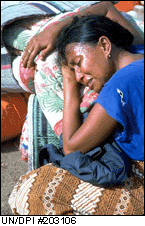|
|
The Brandt Proposals: A Report Card
Debt
| North-South noted that total indebtedness of the least developed countries in 1980 was over $700 billion. Most of this was owed to international banks in the developed countries. The Brandt Reports called for fairer terms for borrowers, along with a program to reduce or eliminate the debts owed by poor nations to rich nations, the World Bank, the International Monetary Fund, and other multilateral lenders. |
|

|
| |
As the Brandt Commission stressed, forgiveness of sovereign debt would trigger both an enormous boost and an historic turning point in international development. Poor nations could break the vicious cycle of borrowing, producing for export, running a trade surplus, earning foreign exchange, and repaying their debt. Instead of being diverted into debt payments, export earnings could be used to increase investment and import new technology to raise productivity. Also, the less they are forced to compete with other developing nations for advantage in exports, the more prices would rise in the global market for their commodities, textiles, food products, and raw materials. This would mean higher wages, increased purchasing power, renewed appetite for world products, stable interest rates, and less violent swings in their balance-of-payments accounts. By reversing the net outflow of capital to developed economies through the stimulus of debt forgiveness, poor nations would enjoy the possibility of real development and growth, many for the first time. |
| |
 |
|
After twenty years, there has been no basic change in the policies by which loans are extended to developing nations, which remain heavily dependent on exports and foreign exchange. Foreign currency earnings and domestic resources that could be channeled into programs for the basic needs of citizens are still used to service huge external debts. The debt burden in the poorest countries is staggering. Many countries in Africa, for example, pay four times more in interest on their debt than they spend on disease prevention, health care, and education for their people. |
|
|
Annual foreign debt payment is larger than the national income (GNP) in the world's thirty poorest countries; in twenty other developing nations, annual foreign debt payment is nearly as much as annual income. Under the present global monetary regime, these cash-strapped economies have no possibility of flourishing. New funds are used just to pay off existing creditors.
To add insult to injury, the austerity conditions required by the International Monetary Fund for development loans – known as structural adjustment programs – have led to social breakdowns in scores of poor nations. IMF conditionality has resulted in deep cuts in government spending for health care and education, layoffs of public sector employees, depletion of state assets, and devaluation of national currencies. In addition, IMF policies have led indirectly to the conversion of local lands into large-export crop farming and cattle farming, as well as the razing of forests and widespread migration from depressed areas, as peasant farmers are forced from the fields of their ancestors.
While the Brandt Commission managed to put the issue of debt relief onto the international agenda, only a handful of rich nations and major banks responded. There have been no meaningful reforms, just the occasional willingness to postpone a nation's debt payments. Fortunately, the issue of debt relief has been taken to heart by a new generation of activists, and their voices are being heard. |
| |
| In 1996, the World Bank and the International Monetary Fund began to concede that some Third World debt might have to be written off. In 2000, the World Bank and IMF granted $220 billion in debt relief to 22 of the world's poorest countries, less than 50% of those countries' debts. However, some of the terms in that relief package – requiring countries to maintain high levels of exports for many years into the future – were onerous and highly unrealistic. The plan did not amount to debt relief, but longer terms for the repayment of loans. |
|
 |
| |
|
Bowing to similar pressure in 1999, representatives from the Group of Seven nations – Japan, Italy, Germany, France, Britain, Canada and the United States – proposed a reduction of $127 billion in the debt owed by the 33 poorest nations, mostly in Africa. It was to be financed by sales of 10 million ounces of IMF gold reserves. After a flurry of resistance from gold-mining nations and the US Congress, this debt write-off plan was rejected. Likewise, President Clinton's alternative proposal, to cancel 100% of the debt owed to the US by the world's poorest nations, never made it to Congress.
Meanwhile, developing country debt is nearly $3 trillion and threatens to engulf the world economy in prolonged recession, as poor nations continue to experience major difficulties making loan payments. This debt cannot possibly be paid – and everyone knows it. To insist otherwise is folly, condemning the disadvantaged to continued misery and futility, and hastening the day when world finances will be adjusted, perhaps quickly and severely. |
| |
 |
|
As a means of modern impunity, debt makes legitimate our inequitable system of exchange. It allows one person to control another, though the mechanism of that control may be indirect or concealed. The popular call for debt forgiveness in developing nations is a hopeful sign that increasing numbers of people in developed nations understand the real issues underlying global economic disparity. Someday, all societies may recognize that benefiting from others' indebtedness is to deny them the freedom, dignity, and self-realization that is their birthright. |
|
When trust and equality prevail and the debt of developing nations is at last forgiven, the world will undergo a social, psychological, cultural, and economic renaissance only dreamed of today. |
| |
| GRADE: D- |
|
|
|
|
|
|
|
|
|

